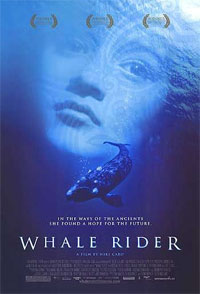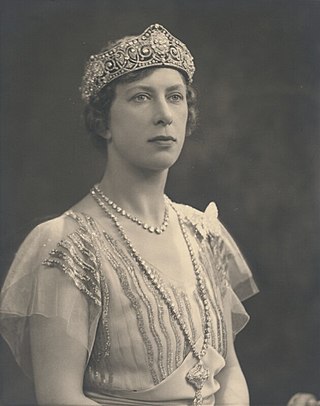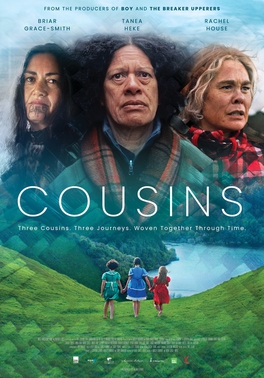
Whale Rider is a 2002 New Zealand drama film written and directed by Niki Caro. Based on the 1987 novel The Whale Rider by Witi Ihimaera, the film stars Keisha Castle-Hughes as Kahu Paikea Apirana, a twelve-year-old Māori girl whose ambition is to become the chief of the tribe. Her grandfather believes that this is a role reserved for males only.

Mary, Princess Royal was a member of the British royal family. She was the only daughter of King George V and Queen Mary, the sister of Kings Edward VIII and George VI, and aunt of Elizabeth II. In the First World War, she performed charity work in support of servicemen and their families. She married Henry Lascelles, Viscount Lascelles, in 1922. Mary was given the title of Princess Royal in 1932. During the Second World War, she was Controller Commandant of the Auxiliary Territorial Service. The Princess Royal and the Earl of Harewood had two sons, George Lascelles, 7th Earl of Harewood, and The Honourable Gerald Lascelles.

Freaky Friday is a comedic children's novel written by Mary Rodgers, first published by Harper & Row in 1972. It has been adapted for several films, including versions in 1976, 1995, 2003, 2018 and 2020.

Lake Wānaka is New Zealand's fourth-largest lake and the seat of the town of Wānaka in the Otago region. The lake is 278 meters above sea level, covers 192 km2 (74 sq mi), and is more than 300 m (980 ft) deep.

The monarchy of New Zealand is the constitutional system of government in which a hereditary monarch is the sovereign and head of state of New Zealand. The current monarch, King Charles III, acceded to the throne following the death of his mother, Queen Elizabeth II, on 8 September 2022 in the United Kingdom. The King's elder son, William, Prince of Wales, is the heir apparent.

Dame Te Atairangikaahu was the Māori queen for 40 years, the longest reign of any Māori monarch. Her full name and title was Te Arikinui Dame Te Atairangikaahu. Her title Te Arikinui and name Te Atairangikaahu were bestowed when she became monarch; previously she was known as Princess Piki Mahuta and, after marriage, Princess Piki Paki. Her full whakapapa (lineage) name, linking her to previous Māori monarchs, was Te Atairangikaahu Korokī Te Rata Mahuta Tāwhiao Pōtatau Te Wherowhero.

Sally Ann Howes was an English actress and singer. Her career on screen, stage and television spanned six decades. She is best known for the role of Truly Scrumptious in the 1968 musical film Chitty Chitty Bang Bang. In 1963, she was nominated for a Tony Award for Best Lead Actress in a Musical for her performance in Brigadoon.
Her Majesty may refer to:

The Silver Jubilee of Elizabeth II marked the 25th anniversary of the accession of Queen Elizabeth II on 6 February 1952. It was celebrated with large-scale parties and parades throughout the United Kingdom and the Commonwealth throughout 1977, culminating in June with the official "Jubilee Days", held to coincide with the Queen's Official Birthday. The anniversary date itself was commemorated in church services across the land on 6 February 1977, and continued to be for the rest of that month. In March, preparations started for large parties in every major city of the United Kingdom, as well as for smaller ones for countless individual streets throughout the country.
Moana Maree Maniapoto is a New Zealand singer, songwriter and documentary maker. Widely considered one of New Zealand's most successful indigenous acts, her music is described as a fusion of traditional Māori haka, chants and taonga pūoro, with contemporary soul, reggae and classical styles. Moana was briefly married to New Zealand politician and radio personality Willie Jackson, during which time she was known as Moana Maniapoto-Jackson; they divorced in 2001. In 2016, Moana was inducted into the New Zealand Music Hall of Fame.

Korokī Te Rata Mahuta Tāwhiao Pōtatau Te Wherowhero was the fifth Māori King. He was the elder son of the fourth Māori King, Te Rata Mahuta, and Te Uranga Matai of the Ngāti Korokī tribe.

Meri Te Tai Mangakāhia was a campaigner for women's suffrage in New Zealand, who inspired future generations of Māori women.
The 2001 Nokia New Zealand Film Awards were held on 10 November 2001 at the St James Theatre in Wellington, New Zealand. To better suit the release schedule of the film industry, the date of the awards ceremony was moved from a mid-year date of previous years to November. The awards were presented by the New Zealand Academy of Film and Television Arts and sponsored by Nokia New Zealand who also sponsored the Nokia New Zealand Film Awards Scholarship, awarded to a film student. The awards presentation featured a tribute to director John O'Shea.

Kawa is a 2010 New Zealand film directed by Katie Wolfe originally titled Nights in the Gardens of Spain. The film stars Calvin Tuteao as Kawariki. A coming out film drama, it is based on the novel Nights in the Gardens of Spain by Witi Ihimaera.

Dame Alcyion Cynthia Kiro is a New Zealand public-health academic, administrator, and advocate, who has been serving as the 22nd governor-general of New Zealand since 21 October 2021. Kiro is the first Māori woman and the third person of Māori descent to hold the office.

Dame Ruia Mereana Morrison is a retired New Zealand tennis player. Morrison was the first New Zealand woman and the first Māori person to play at Wimbledon and reached the fourth round in both 1957 and 1959. She also won 13 national New Zealand tennis titles.
Witarina Te Miriarangi Parewahaika Harris was a New Zealand film actress, Māori language advocate, entertainer and public servant. She featured in the 1929 Universal Pictures silent film Under the Southern Cross as the heroine Princess Miro in her only film credit.

The Ruby Jubilee of Elizabeth II in 1992 marked the 40th anniversary of the accession of Queen Elizabeth II on 6 February 1952. Contrary to her Silver Jubilee in 1977, it was not regarded as an "official" jubilee. However, the milestone was marked with a number of events and community projects.

Cousins is a 2021 New Zealand film directed by Ainsley Gardiner and Briar Grace-Smith. It is an adaptation of the 1992 novel of the same name by Patricia Grace.

Maisey Rika is a New Zealand singer, songwriter and composer, performing in both English and Māori. Her five original albums have each reached the Top 40 in the Official New Zealand Music Chart. She was named an Arts Foundation Laureate in 2021, has received awards at the Waiata Māori Music Awards and APRA Awards, including APRA Best Māori Songwriter in 2010 and 2013, and has twice won Best Māori Language Album at the NZ Music Awards.
















